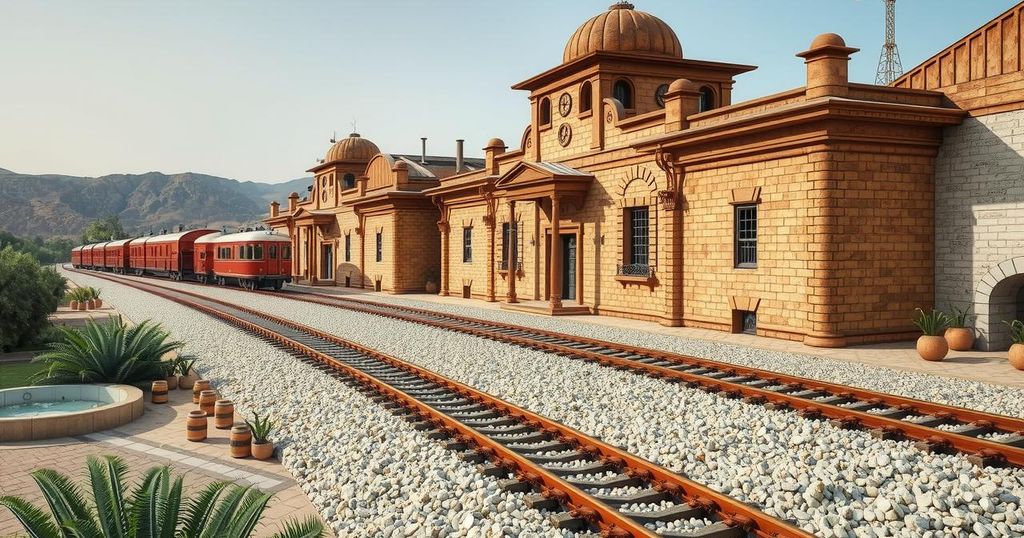World news
ABDULHAMID II, ABDULKA, ABDULKADIR URALOGLU, ANATOLIAN BROADCASTERS ASSOCIATION, ASIA, BASHA, BASHAR AL - ASSAD, DAMASCUS, DISPATCH, FIGHTER JETS, IRAQ, MEDINA, MIDDLE EAST, MILITARY OPERATIONS, NORTH AMERICA, PALESTINE, REC, REFUGEE CRISIS, SAUDI ARABIA, SYRIA, SYRIAN CONFLICT, TAYYIP ERDOGAN, UNITED STATES, URALOGLU, WAR
Michael Grant
0 Comments
Turkey Plans Restoration of Historic Hejaz Railway in Syria
Turkey plans to restore parts of the Hejaz Railway in Syria to reconnect with Damascus. Transportation Minister Abdulkadir Uraloglu announced the initiative as part of rebuilding efforts in post-civil war Syria, highlighting challenges such as stolen railway tracks. The Hejaz Railway, initiated by the Ottoman Empire, serves as a critical historical transportation route for pilgrimage and military mobility.
Turkey has announced plans to restore sections of the historic Hejaz Railway in Syria, aiming to reconnect Turkish railways to Damascus, as articulated by Turkish Transportation Minister Abdulkadir Uraloglu in a recent discussion with journalists. This initiative coincides with ongoing efforts to assist in the reconstruction of Syria after more than a decade of civil unrest.
Minister Uraloglu emphasized the swift assessment and subsequent restoration efforts planned for the railway connection to Damascus during a meeting in Ankara with the Anatolian Broadcasters Association. He noted that while there are extant railway infrastructures stretching from Turkey to Syria, the operational status of many of these lines has been compromised over time. He highlighted that passenger trains had operated between Turkey and this region until approximately 2010, but there are significant challenges ahead, including the issue of stolen railway tracks.
In a separate discussion, President Recep Tayyip Erdogan indicated that all relevant ministers would evaluate the deficiencies within the Syrian infrastructure and provide proposals for assistance to the newly established government in Damascus following the exit of former President Bashar al-Assad, who left amid escalated conflict.
Originally conceived by Ottoman Sultan Abdulhamid II in 1900, the Hejaz Railway represented a monumental ambition to link Istanbul with Mecca, encompassing a route funded largely through Muslim donations. Constructed rapidly, the railway extended from Damascus to Medina, with connections made to Haifa, and served not only as a facilitator for the Hajj pilgrimage but also as a strategic military transport route. Its progress was significantly hindered during World War One and with various acts of sabotage, notably during the British-supported Arab Revolt led by T.E. Lawrence, leading to its incomplete stretch of approximately 400 kilometers short of Mecca.
The Hejaz Railway holds historical significance, having been a pivotal transport route established during the late Ottoman Empire. Its conception aimed to enhance pilgrimage accessibility while reinforcing Ottoman authority over distant territories. Though initially built rapidly thanks to voluntary and sometimes coerced donations, its operational history has been marred by challenges ranging from sabotage to geopolitical conflicts, culminating in its incomplete status at the advent of World War One.
The restoration of the Hejaz Railway showcases Turkey’s intent to play a central role in the reconstruction efforts of Syria, reflecting a broader commitment to regional connectivity and collaboration. While the historical context of the railway presents both symbolic and logistical challenges, Turkey’s initiative signals potential revitalization of important infrastructural ties in the area.
Original Source: www.middleeasteye.net




Post Comment